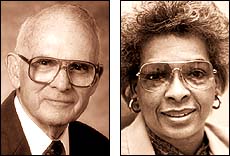

A tribute to those who excel
at championing human rights

s part of Freedom’s dedication to promoting and advancing fundamental human rights and freedoms, the editors initiated a feature in the magazine in 1988 to acknowledge leaders in human rights. The Human Rights Leadership Profiles—now a regular department of the magazine for a decade—highlight the exemplary, and at times extraordinary, work and accomplishments of many individuals in a wide range of fields.
As a result of the positive reader response to the human rights leadership profiles, and particularly to the practice of acknowledging those who are making positive changes in our society, Freedom instituted the Freedom Human Rights Leadership Awards. Award recipients are selected from among those leaders profiled in Freedom and nominations sent in by Freedom readers. Awards have been presented to human rights leaders whose work has been of truly historic impact and consequence.
While the human rights leaders featured in Freedom are many, and their work unquestionably vital in their different fields, a representative sampling showing a diversity of accomplishments has been selected, and follows here:
U.S. Representative Christopher Shays
—for his investigation of Gulf War Syndrome and neglect of servicemen suffering from it, and for forwarding the cause of all those affected by exposure to chemical or biological weapons.
Attorney Barry Fisher
—for his contributions to religious tolerance and rights, and many of the nation’s most important First Amendment cases.

| ||
 |
The Human Rights Leadership Profiles in Freedom Magazine highlight and honor the exemplary, and at times extraordinary, work and accomplishments of many individuals in a wide range of fields. Featured in the past, for example, were the late U.S. Representative John Moss—the father of the United States Freedom of Information Act, signed into law in 1966 which was one of the most significant advancements in the U.S. democratic government since the Constitution and the Bill of Rights, and Wisconsin State Representative Polly Williams, for her pioneering efforts to obtain effective education for America’s children. |
Educator Michael S. Brunner
—for his vital campaign to reverse the misinstruction of children and get education back on track.
U.S. Representative Maxine Waters
—for her accomplishments in combatting social ills of declining education levels, proliferating crime and rampant drug abuse.
Judge Rudolph A. Diaz and Judge Stephen A. Marcus
—for bringing the innovative drug courts to two Los Angeles courts, and their 60% success rate, helping to solve increasing drug-related crime.
Law enforcement leader Gerald S. Arenberg
—for his dedication to protect the public’s right to safety, to help families of police killed in the line of duty, and for calling for stricter controls of Interpol in the early 1990s.
Dr. Georgette Watson
—for her crusade, as head of the Massachusetts Governor’s Alliance Against Drugs, to battle drugs in her state.
Attorney Pat Griffin
—for championing the cause of the surviving victims of the tragic and lethal “deep sleep therapy” at Chelmsford Psychiatric Hospital in Sydney, Australia, achieving their justice and compensation.
Rev. Dr. George Robertson
—for his dedicated efforts to expose the illegal activities of the Cult Awareness Network (CAN) and their destructive “deprogramming.” (Dr. Robertson also now chairs the new, thoroughly reformed CAN).
U.S. Representative Ronald Dellums
—for his stand against chemical/biological warfare testing and for assistance to testing victims, and for his efforts to impose economic sanctions on the racist apartheid regime in South Africa.
Dr. Arthur A. Fletcher
—for his accomplishments in desegregation and achieving equal opportunity for minorities in the United States, inclusive of his career as Chairman of the U.S. Commission on Civil Rights.
Colorado State Legislators Senator Bob Martinez and Representative Mary Anne Tebedo
—for their landmark legislation which provides severe criminal penalties for psychiatrists and psychologists who rape or assault patients.
Attorney Paul Green
—for perseverence in using the justice system to correct itself, in reforming a provision in the North Carolina judicial procedure that denied countless defendants the right to due process.
U.S. Senator Claiborne Pell
—for his work to protect the lives of innocent people, including his stand against the use of poison gas by the Iraqi army, and for the historic Congressional resolution that established Religious Freedom Week.
Dr. Thomas Szasz
—for his advocacy of human liberty against the influences of psychiatry, and his dedication and outspokeness in reforming the profession and its legion abuses.
The late U.S. Representative John Moss
– as the father of the United States Freedom of Information Act, signed into law in 1966, Mr. Moss was responsible for one of the most significant advancements in the U.S. democratic government since the Constitution and the Bill of Rights.
Paul McMasters
—for his contributions to the protection and advancement of freedom of speech as one of the country’s foremost experts on First Amendment issues.
Wisconsin State Representative Polly Williams
—for her pioneering efforts to obtain effective education for America’s children.
Harry Hammitt
—for his longtime advocacy of open government and the Freedom of Information Act, as editor and publisher of Access Reports, widely regarded as the most authoritative source on FOI issues.
Jack Anderson
—for his accomplishments in investigative journalism, bringing about reform in the government and more accountability and honesty in its officials.
U.S. Senator Harry Reid
—for his measures to protect and advance childrens’ rights, to restore the rights of radiation victims, and his stand against abuses in the Internal Revenue Service.
Freedom regularly accepts suggestions for human rights leadership profiles, and nominations for awards. By underscoring positive accomplishments and constructive reforms that advance human rights, Freedom’s editors and publisher also seek to encourage the idea that individuals with integrity, goals and dedication to them, can—and frequently do—make a difference.

